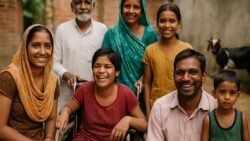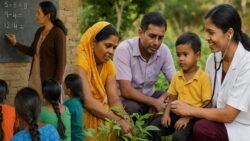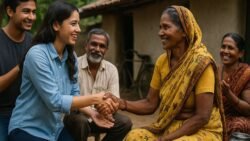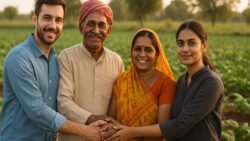Works With Communities – UFDP, the Unidevelopment Foundation & Development Partners, strives to foster transformational change in underserved communities by placing education, inclusion, and health at the heart of its mission. Through collaborative programs across remote, rural, and marginalized populations, UFDP intervenes in fundamental areas such as early childhood learning, gender equality, and healthcare access. By working with local stakeholders — from village leaders to school teachers, health workers, and caregivers — UFDP builds capacity for sustainable development. In education, UFDP supports foundational literacy, vocational training, and digital skills, ensuring young people are prepared for both employment and civic participation. On inclusion, the foundation emphasizes reducing discrimination against persons with disabilities, gender minorities, and economically vulnerable groups, enabling full participation in community life. In health, UFDP promotes programs spanning maternal and child health, nutrition, sanitation, and preventative healthcare. By integrating its interventions, UFDP ensures that uplift is holistic — meaning economic, social, and physical well‑being rise together. The approach is underpinned by transparency, monitoring and evaluation, and adapting to community feedback so that impact is both tangible and lasting.

Strengthening Education for Lifelong Empowerment
Education is one of the pillars through which UFDP empowers communities to transform their future. By focusing on early childhood learning, UFDP ensures that children have access to quality pre‑school or foundational classes even in remote areas, building strong literacy and numeracy skills from the start. UFDP also addresses the digital divide by integrating digital tools and facilitating teacher training programs that help educators use modern pedagogies. In vocational education and skill building, UFDP helps adolescents and young adults acquire market‑relevant skills — trades, crafts, computer skills — so they can earn livelihoods close to home or participate in wider economic opportunities. Moreover, UFDP works to ensure that marginalized groups — girls, disabled children, tribal or caste‑minority youth — are included in all educational programs. This is essential because, as studies show, inclusive education improves social cohesion, reduces dropout rates, and boosts long‑term economic outcomes. For example, organizations working in Africa use whole‑school improvements and teacher capacity building to improve quality and access in poor and rural districts Link Community Development.
Promoting Inclusion: Bridging Gaps, Building Communities
Inclusion is a core value of UFDP’s work, ensuring no one is left behind. UFDP actively engages persons with disabilities, women and girls, minority groups, and economically marginalized individuals, not merely as beneficiaries but as participants in decision‑making. This includes designing programs that adapt infrastructure, curricula, and healthcare delivery to be accessible; supporting self‑advocacy; and working with communities to dismantle social or cultural barriers. UFDP also partners with international organizations and uses best practices to create inclusive education environments and promote health equity. For instance, micro‑grant projects integrate disability inclusion into health promotion and community programs, ensuring accessible facilities and inclusive policies for all NCHPAD Inclusion Grants. Such inclusion yields multiple benefits: improved health, greater participation in education and civic life, and social cohesion. By embedding inclusion into every project component, UFDP helps shift community norms toward respect, dignity, and equal value for all.
Health Interventions: Preventive, Curative, Community‑Led
Health is central to UFDP’s mission, and its interventions are designed to prevent disease, treat illness, and empower communities to maintain well‑being. UFDP supports maternal and child health services — such as antenatal care, immunization, nutrition counseling, and safe delivery — especially in areas where such services are scarce. Community health workers are trained to identify and respond to local health challenges including malnutrition, infectious disease, and sanitation issues. Preventive care is emphasized through health education campaigns that promote hygiene, clean water, vaccination, and awareness around non‑communicable disease risk factors. UFDP also facilitates access to curative care by linking remote populations with clinics or through mobile health units, thereby reducing geographic and financial barriers. International research underscores that community‑based health promotion and inclusion of local stakeholders improves health outcomes in marginalized communities NIH Community Health Study.
Partnerships, Sustainability, and Measuring Impact
UFDP recognises that lasting change requires strong partnerships, community ownership, and rigorous evaluation. The foundation collaborates with local government bodies, NGOs, educational institutions, and health care providers to ensure programs are contextually relevant and resource‑efficient. Local leaders, volunteers, and communities are involved in every stage — from design to implementation, monitoring, and feedback loops. UFDP also emphasises sustainability: training local staff, building infrastructure that can be maintained locally, and using cost‑effective, scalable models. Impact is measured through both quantitative indicators (school enrollment, health metrics, nutrition levels) and qualitative data (community satisfaction, levels of inclusion, changes in attitudes). Learning is iterative: lessons from past projects are used to refine methods and expand successful models. By ensuring that programs are evidence‑based, inclusive, and community‑owned, UFDP amplifies its capacity to uplift lives across education, inclusion, and health for years to come.






